Intro
Discover the severe High Blood Pressure Effects, including cardiovascular disease, heart failure, and stroke, and learn how to manage hypertension through lifestyle changes and medication to reduce risks.
High blood pressure, also known as hypertension, is a serious health condition that affects millions of people worldwide. It is a major risk factor for heart disease, stroke, and kidney disease, and can have a significant impact on a person's quality of life. In this article, we will explore the effects of high blood pressure on the body, and discuss ways to manage and prevent this condition.
High blood pressure is a condition in which the blood pressure in the arteries is consistently too high. This can cause damage to the blood vessels, heart, and other organs, and can increase the risk of heart attack, stroke, and kidney disease. The effects of high blood pressure can be far-reaching, and can impact many different aspects of a person's life. From the way they feel physically, to their mental health and wellbeing, high blood pressure can have a significant impact on a person's overall health.
The importance of managing high blood pressure cannot be overstated. If left untreated, high blood pressure can lead to serious health complications, including heart disease, stroke, and kidney disease. In fact, according to the American Heart Association, high blood pressure is the leading cause of death worldwide, accounting for over 360,000 deaths per year in the United States alone. However, with proper management and treatment, it is possible to control high blood pressure and reduce the risk of these complications.
Understanding High Blood Pressure
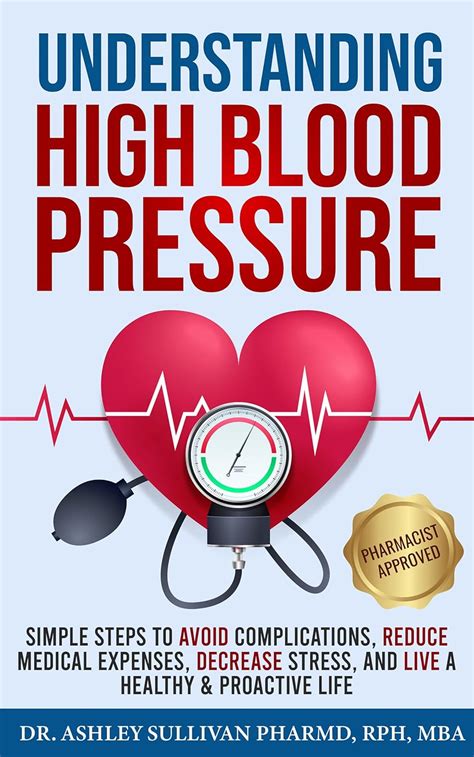
High blood pressure is a complex condition, and there are many different factors that can contribute to its development. Some of the most common causes of high blood pressure include genetics, diet, lifestyle, and underlying medical conditions. For example, people who have a family history of high blood pressure are more likely to develop the condition, as are those who are overweight or obese, or who have a diet that is high in sodium and low in potassium. Additionally, certain medical conditions, such as kidney disease or sleep apnea, can also increase the risk of developing high blood pressure.
Types of High Blood Pressure
There are two main types of high blood pressure: primary and secondary. Primary high blood pressure, also known as essential hypertension, is the most common type of high blood pressure, and is caused by a combination of genetic and lifestyle factors. Secondary high blood pressure, on the other hand, is caused by an underlying medical condition, such as kidney disease or a hormonal imbalance.Effects of High Blood Pressure on the Body
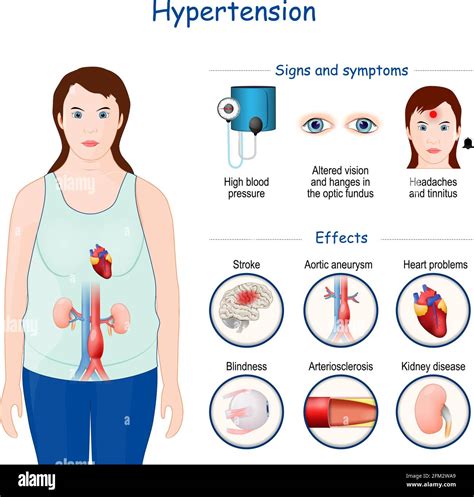
High blood pressure can have a significant impact on the body, and can increase the risk of many different health complications. Some of the most common effects of high blood pressure include:
- Heart disease: High blood pressure can cause damage to the blood vessels, which can increase the risk of heart disease.
- Stroke: High blood pressure can also increase the risk of stroke, which occurs when the blood supply to the brain is interrupted.
- Kidney disease: High blood pressure can damage the kidneys, which can increase the risk of kidney disease.
- Vision loss: High blood pressure can also increase the risk of vision loss, as it can cause damage to the blood vessels in the eyes.
Managing High Blood Pressure
Managing high blood pressure requires a comprehensive approach that includes lifestyle changes, medication, and regular monitoring. Some of the most effective ways to manage high blood pressure include:- Eating a healthy diet: Eating a diet that is low in sodium and high in potassium can help to lower blood pressure.
- Getting regular exercise: Regular exercise can help to lower blood pressure and improve overall health.
- Quitting smoking: Smoking can increase blood pressure, so quitting can help to lower it.
- Reducing stress: Stress can increase blood pressure, so finding ways to manage stress, such as through meditation or deep breathing, can help to lower it.
Treatment Options for High Blood Pressure
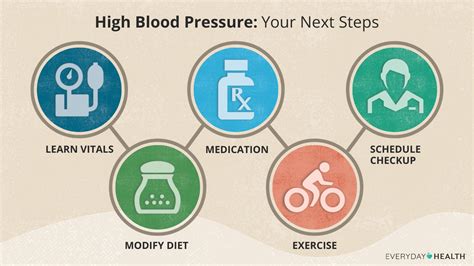
There are many different treatment options available for high blood pressure, including lifestyle changes, medication, and alternative therapies. Some of the most common medications used to treat high blood pressure include diuretics, beta blockers, and ACE inhibitors. Alternative therapies, such as acupuncture and herbal supplements, may also be effective in lowering blood pressure.
Lifestyle Changes for Managing High Blood Pressure
Lifestyle changes are an essential part of managing high blood pressure. Some of the most effective lifestyle changes include:- Eating a healthy diet: Eating a diet that is low in sodium and high in potassium can help to lower blood pressure.
- Getting regular exercise: Regular exercise can help to lower blood pressure and improve overall health.
- Quitting smoking: Smoking can increase blood pressure, so quitting can help to lower it.
- Reducing stress: Stress can increase blood pressure, so finding ways to manage stress, such as through meditation or deep breathing, can help to lower it.
Preventing High Blood Pressure
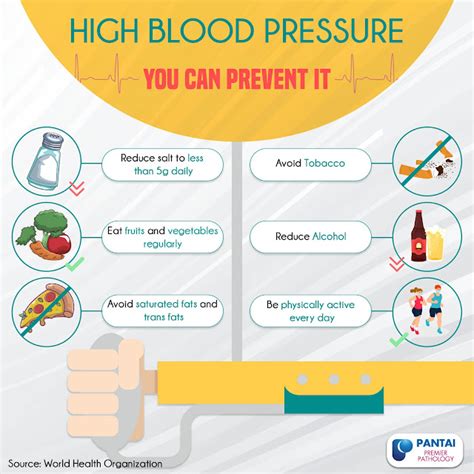
Preventing high blood pressure requires a comprehensive approach that includes lifestyle changes, regular monitoring, and early intervention. Some of the most effective ways to prevent high blood pressure include:
- Eating a healthy diet: Eating a diet that is low in sodium and high in potassium can help to lower blood pressure.
- Getting regular exercise: Regular exercise can help to lower blood pressure and improve overall health.
- Maintaining a healthy weight: Maintaining a healthy weight can help to lower blood pressure and reduce the risk of other health complications.
- Getting regular check-ups: Getting regular check-ups can help to identify high blood pressure early, and allow for early intervention.
Risk Factors for High Blood Pressure
There are many different risk factors for high blood pressure, including genetics, diet, lifestyle, and underlying medical conditions. Some of the most common risk factors include:- Family history: People who have a family history of high blood pressure are more likely to develop the condition.
- Age: The risk of high blood pressure increases with age.
- Obesity: Being overweight or obese can increase the risk of high blood pressure.
- Physical inactivity: A lack of physical activity can increase the risk of high blood pressure.
- Smoking: Smoking can increase blood pressure, and increase the risk of other health complications.
Living with High Blood Pressure
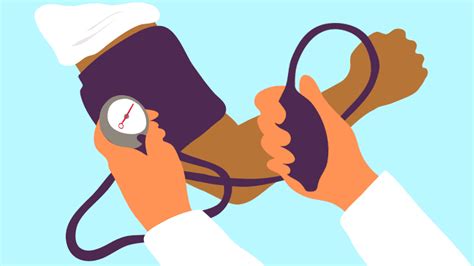
Living with high blood pressure requires a comprehensive approach that includes lifestyle changes, medication, and regular monitoring. Some of the most effective ways to manage high blood pressure include:
- Eating a healthy diet: Eating a diet that is low in sodium and high in potassium can help to lower blood pressure.
- Getting regular exercise: Regular exercise can help to lower blood pressure and improve overall health.
- Quitting smoking: Smoking can increase blood pressure, so quitting can help to lower it.
- Reducing stress: Stress can increase blood pressure, so finding ways to manage stress, such as through meditation or deep breathing, can help to lower it.
Coping with High Blood Pressure
Coping with high blood pressure can be challenging, but there are many different strategies that can help. Some of the most effective ways to cope with high blood pressure include:- Seeking support: Seeking support from friends, family, or a support group can help to manage stress and improve overall health.
- Practicing stress-reducing techniques: Practicing stress-reducing techniques, such as meditation or deep breathing, can help to lower blood pressure and improve overall health.
- Getting enough sleep: Getting enough sleep can help to lower blood pressure and improve overall health.
- Staying active: Staying active can help to lower blood pressure and improve overall health.
Conclusion and Next Steps

In conclusion, high blood pressure is a serious health condition that requires a comprehensive approach to management and prevention. By understanding the causes and effects of high blood pressure, and by making lifestyle changes and seeking medical treatment, it is possible to manage and prevent this condition. If you are concerned about high blood pressure, or if you have already been diagnosed with the condition, it is essential to work with your healthcare provider to develop a treatment plan that is right for you.
We encourage you to share your thoughts and experiences with high blood pressure in the comments below. Have you been diagnosed with high blood pressure, or do you have a family history of the condition? What steps have you taken to manage and prevent high blood pressure? By sharing your story, you can help to raise awareness about this important health issue, and support others who may be struggling with high blood pressure.
What are the symptoms of high blood pressure?
+High blood pressure often has no symptoms, but it can cause headaches, dizziness, and nosebleeds in some people.
How is high blood pressure diagnosed?
+High blood pressure is typically diagnosed with a blood pressure test, which measures the pressure in the arteries.
What are the risks of untreated high blood pressure?
+Untreated high blood pressure can increase the risk of heart disease, stroke, and kidney disease, and can even be fatal.
Can high blood pressure be prevented?
+Yes, high blood pressure can be prevented by making lifestyle changes, such as eating a healthy diet, getting regular exercise, and managing stress.
What are the best ways to manage high blood pressure?
+The best ways to manage high blood pressure include making lifestyle changes, such as eating a healthy diet, getting regular exercise, and managing stress, as well as taking medication as prescribed by a healthcare provider.
